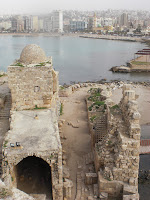During the last couple of weeks I've found time in my busy schedule to visit two historical cities outside of Beirut.
Saida, usually rendered in English as Sidon, is an hour's minibus journey (which costs just over $1) along a pleasant coast road to the south of Beirut. Cola Junction, the capital's hectic bus terminal, consists of buses parked on a roundabout underneath a large overpass with drivers and conductors approaching passers by to ask their destination and then helpfully pointing them in the right direction. Once this has been successfully navigated, the minibus edges its way through the traffic towards the southern outskirts of the city (where Hezbollah banners and posters of vilified Syrian president Bashar al-Assad and assassinated former Lebanese prime minister Rafik Hariri can all be spotted near to the road) before making it onto the open road.
 From here it is plain sailing to Saida, a small city with a much more oriental feel than glamorous central Beirut. The two main attractions in the town are its 13th-century Crusader-built castle on a small promontory in a natural harbour, and souk or traditional Arabic market. The castle, despite being right over the road from the souk, offers a calming solitude far from the din of Beirut's 'aj'at sir (traffic jams). There are very few tourists despite the impressive historical attractions on offer. I spoke to two other foreigners only - an Iraqi couple on their honeymoon who approached me to say hello.
From here it is plain sailing to Saida, a small city with a much more oriental feel than glamorous central Beirut. The two main attractions in the town are its 13th-century Crusader-built castle on a small promontory in a natural harbour, and souk or traditional Arabic market. The castle, despite being right over the road from the souk, offers a calming solitude far from the din of Beirut's 'aj'at sir (traffic jams). There are very few tourists despite the impressive historical attractions on offer. I spoke to two other foreigners only - an Iraqi couple on their honeymoon who approached me to say hello.The souq offers the kind of experience one might expect from a visit to a Middle Eastern country - narrow alleys, stray cats, the smell of food being cooked, handcrafted furniture and narghile pipes, and the heartachingly romantic sound of the call to prayer, seeping through the small gaps between the buildings from several mosques within the approximately 1 square mile area of the souq.
Byblos, also known as Jbair, lies a similar distance from Beirut to Saida, but to the north. It is arguably the world's oldest city, with evidence of settlement from as long ago as 5000 B.C.E. It has a much larger castle on a hilltop overlooking the coast all the way back to Beirut. Originally built by the Romans, the castle was appropriated successively by the Crusaders, Mamluks and Ottomans. It is still standing and is an impressive place evocative of any King Arthur story. More tourist-conscious than Saida, Byblos also boasts a slightly tacky 'mini-souq' of gift shops but does have a beautiful harbour where we sat and contemplated the sunset.
I will add pictures from Byblos (and the souq at Saida) at a later date - I didn't have my camera with me on the day.
Lebanon continues to provide inspiration, awe and new perspectives, and there is a huge amount left to see. I am also planning to write about the different groups of people and some of the Lebanese individuals I have been fortunate enough to meet once I have been here a while longer.














